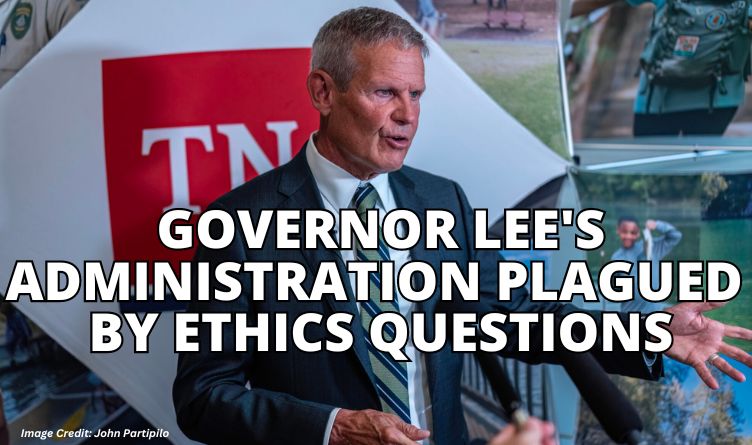Lee refuses to repay group that funded a South Florida trip to speak at a conference.
Image Credit: John Partipilo
By Sam Stockard [The Tennessee Lookout -CC BY-NC-ND 4.0] –
A series of missteps by the state education commissioner and a perceived error in judgment by the governor is bringing greater scrutiny to the state’s ethics rules and relationships officials hold with lobbying groups.
Democrats are threatening to file yet another sworn complaint for a state ethics violation and pass legislation in 2025 to avert indiscretions. Even Republicans are irritated with the governor’s actions because of public perception, but mainly because they could have been avoided.

Gov. Bill Lee said Friday he will not repay a group called Alliance Defending Freedom, an Arizona-based group that claims to be Conservative Christian, that funded his expenses to speak to its conference this July at an exclusive South Florida beach.
Lee contended it held the tax designation as a 501(c)3 group and state law allows it to pay for his July trip there to speak, even though its lobbying arm, ADF Action, uses a state lobbyist, Matthew Lorimer, who pushed legislation this year in the General Assembly.
ADF Action spent between $20,000 and $50,000 on lobbying in Tennessee in 2023 and between $10,000 and $25,000 in the first half of 2024, according to a Tennessee Lookout analysis.
The Tennessean published a report about Lee’s trip as the Tennessee Ethics Commission dismissed a sworn complaint last week against Education Commissioner Lizzette Reynolds who took trips to two out-of-state conferences paid for by her former employer, pro-voucher and pro-charter group ExcelInEd.
The commission declined to refer the case to the Attorney General’s Office because Reynolds paid back more than $2,000 for the trips (she was later reimbursed by the state), but members noted it was “disappointing” it had to take up the matter and recommended steps the governor should take to educate his cabinet about state ethics laws.
Critics said that made it clear the commission felt Reynolds violated Tennessee’s ethics laws, which prohibit state officials from accepting gifts from outside groups that lobby state leaders.
Lee, who has continually defended Reynolds this year, said Tuesday he believes the two cases are different and noted he was asked to speak at the conference with the 501(c)3 group offering to reimburse him for hotel and travel expenses. He called it “customary and allowable under the law.”
“It’s an acceptable expense, and I don’t have a plan to repay because it’s a legal expense,” Lee said.
The governor, though, did say he felt members of his cabinet should go through the same ethics training as lawmakers at the start of each session.
“I think it’s a great idea. The more people understand exactly what the rules are and how to follow them, the more transparency to that, the better it is,” Lee said.
The governor noted his senior advisory team has discussed the matter, leaving critics in a quandary as to why he would support only half of the Ethics Commission’s recommendations.
The governor said Tuesday he didn’t think his actions violated “the spirit of the law” either.
Yet he issued an executive order shortly after taking office six years ago prohibiting executive branch employees from soliciting or accepting gifts such as lodging and transportation, and food and beverage from many outside groups.
Those include any entity that is trying to obtain a state contract, conduct operations regulated by the state or those that have “interests that may be substantially affected by the performance or nonperformance of the employee’s official duties.”

Another complaint looming
Lawmakers are befuddled by the questions surrounding Reynolds and Lee, including some Republicans who don’t like the appearance because his alleged discrepancy was similar to Reynolds’ violation.
Lee could have avoided complaints by paying for the trip out of his campaign funds, as he did with the same plane flight for his chief of staff, who traveled to the event. He also could have let the state pay for it, much as he did for a trip to the Republican National Convention in Milwaukee.
Democrat state Rep. John Ray Clemmons said Tuesday if the governor fails to repay the money, House Democrats will file another ethics complaint against his administration.
Clemmons argued that Lee is “not above the law,” and pointed out the governor “knowingly accepted gifts” from an organization that advocates for passage of state policies.
“This is a prima facie violation of state ethics policy intended to prevent or create the appearance of one using public office for private gain, giving preferential treatment to an organization, losing impartiality, and/or affecting adversely the confidence of the public in the integrity of the government,” Clemmons, chairman of the House Democratic Caucus, said in a statement.
Clemmons said there should be “no exception” for the governor, harkening back to former Gov. Ray Blanton, a West Tennessee Democrat who was ousted from office at the end of his term in 1979 for taking kickbacks to pardon criminals.
Democratic state Rep. Caleb Hemmer of Nashville applauded the Ethics Commission for a proposal requiring the governor’s cabinet to take ethics training, though he said he could request a hearing on the Reynolds complaint if more information surfaces.
Hemmer also said he plans to seek an attorney general’s opinion for clarification on Lee’s Florida trip while working with legislative attorneys and the House ethics counsel to update ethics statutes so “employers of lobbyists can’t use separate affiliated entities to fund travel and skirt our current ethics laws.”
In addition, Hemmer said he believes the governor and cabinet members should be added to a state law requiring legislators to disclose out-of-state travel funded by “outside interests.”
A handful of lawmakers, including Rep. Jeremy Faison, chairman of the House Republican Caucus, repaid a trip to the southern border last year that was funded by the nonprofit foundation of Americans for Prosperity, a Koch Industries-funded organization that lobbies lawmakers on a variety of issues such as support for private-school vouchers.
Other Republicans who took the trip to see the “crisis” situation were Rep. Clark Boyd of Lebanon, Rep. Rusty Grills of Newbern, Rep. Chris Todd of Madison County and Sen. Adam Lowe of Calhoun. They traveled there with AFP employee Michael Lotfi and AFP-Tennessee director Tori Venable, the group’s main lobbyist.
Even though the nonprofit entities for such groups are often made up of the same people as their lobbying organizations, Lee said Tuesday he still won’t pay back the money because “the spirit of the law is pretty clear. 501(c)3’s customarily provide for travel expenses for speakers and that was the case.”
Yet Lorimer reportedly works for Alliance Defending Freedom but is also a registered lobbyist connected to ADF Action.

Republican irritation
Sen. Richard Briggs, a Knoxville Republican, said this week the appearances of Lee’s trip “don’t look particularly good.” But he is bothered more by Reynolds’ trips funded by ExcelInEd.
“She’s done several things where she’s made false statements to get reimbursed,” Briggs said. “I don’t think she has even met the standard to be the education commissioner.”
Briggs contends Reynolds was hired for one reason: to push the governor’s private-school voucher plan.
Lee appointed Reynolds to the post in mid-2023, and Democrats immediately said she was not qualified under state law. She had worked in the U.S. Education Department and for ExcelInEd, but she wasn’t certified to teach at the highest level of K-12 education, a requirement for Tennessee education commissioners.
Reynolds also held on to her primary Texas residence, a potential violation of Tennessee voter registration laws. And when she enrolled in a teacher education course at UT-Martin, she signed a sworn affidavit saying she had been a state employee for six months to receive a tuition waiver. She had been the commissioner for only three months.
Democrat Sen. Heidi Campbell said the state’s rules and laws are ineffective at stopping unseemly relationships between state leaders and outside groups, including those with lobbyists.
“We’re living in a totalitarian state where the controlling party just does whatever they want to,” Campbell said.

Where’s the conflict?
The Senate and House, both of which are controlled by Republican supermajorities, set their own rules.
Lt. Gov. Randy McNally sees no need for change, either, saying he believes the Senate’s ethics rules are effective. He pointed out each member “not only embraces the letter of those rules but their spirit as well.”
But while the Senate has what is called Rule 13, which allows senators to declare they have a conflict of interest, they don’t have to state the details of the conflict or put it in writing so the public can find out how they could benefit from a certain vote.
When Briggs served on the Knox County Commission, if members declared a conflict of interest, they couldn’t participate in the debate or vote on the matter. He felt it worked at that level, but as a senator, he’s not so sure, pointing out that if senators opt against voting because of a conflict, then more than 210,000 people lose their voices in the General Assembly.
Briggs acknowledged he declared Rule 13 when he had a farm with greenbelt status, which allows it to be taxed at a lower rate, as the Senate voted on related legislation. He also makes the declaration when the Senate votes on veterans benefits because he served as an Army physician.
Briggs, though, said he would consider changing the policy to require senators to write down their conflict if they declare Rule 13.
Campbell, a regular critic of Republican policy, considers Rule 13 a “get out of jail free card” that enables senators to avoid being held accountable for whatever conflict they have.
About half the chamber’s 33 members declared the conflict this year when the Legislature eliminated the property portion of the state’s franchise tax on businesses. It will cost an estimated $4 billion in revenue over the next decade, in addition to $1.55 billion in rebates for the last three years.
Despite those conflicts, Republican members voted overwhelmingly for the tax cut, leaving the public in the dark about potential conflicts.
“We will never really see why,” Campbell said.




One Response
Bill was ‘supposed’ to be different, a ‘business man’ with no political ambitions, just wanting to ‘serve’ the people. And, we all knew he was a bit naive, but now these issues are arising not because he is unethical, but because he is naive. He takes for granted that most in politics have an agenda and it ‘ain’t’ to ‘serve’ the people, but more self-serving! He needs to wake up and be a strong, leaders demanding a strong ethic from himself and his cabinet….and to ‘flee the very appearance of evil’! Many of his moves and initiatives may be from the heart but it is becoming more clear that one of two alternatives are evident, that he remains naive or that there are some ethical challenges raising their ugly heads.